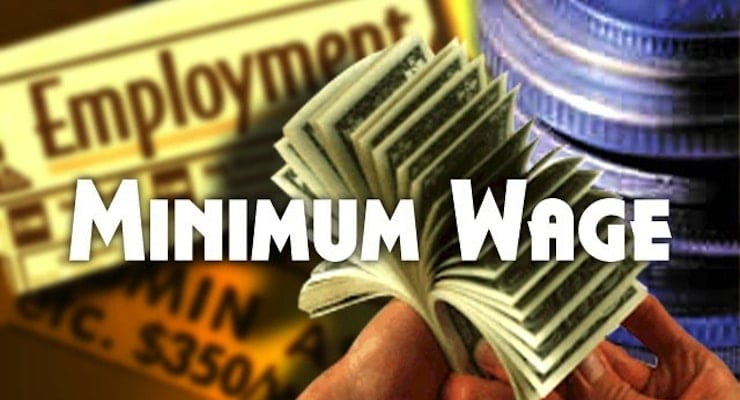

Minimum Wage Graphic Image
The real world is like a cold shower for our friends on the left. Everywhere they look, there is evidence that jurisdictions with free markets and small government outperform places with big welfare states and lots of intervention.
That’s true when comparing nations. And it’s also true when comparing states. That must be a source of endless frustration an disappointment for statists.
Speaking of disappointed statists, the real world has led to more bad news. The left-wing Mayor of Baltimore campaigned in favor of a $15 minimum wage, but then decided to veto legislation to impose that mandate. The Wall Street Journalopines on this development.
Mayor Catherine Pugh, a Democrat, has rejected a bill that would raise the city’s minimum wage to $15 an hour by 2022. She did so even though she had campaigned in favor of raising the minimum wage, which shows that economic reality can be a powerful educator. She explained her change of heart by noting that raising the rate above the $8.75 an hour minimum that prevails in the rest of Maryland would send jobs and tax revenue out of Baltimore to surrounding counties. The increase would also have raised the city’s payroll costs by $116 million over the next four years when she’s already coping with a deficit of $130 million in the education budget.
The key thing to notice is that the Mayor recognized that the real-world impact of bad legislation is that economic activity would shrink in the city and expand outside the city.
Writing for Reason, Eric Boehm also points out that the Mayor was constrained by the fact neighboring jurisdictions weren’t making the same mistake.
Pugh said the bill would not be in the best interest of Baltimore’s 76,000 unemployed workers and would drive businesses out of the city to the surrounding counties. …Indeed. Raising the minimum wage would not solve Baltimore’s economic troubles, and would likely only add to them. While support for a $15 minimum wage has become something of a litmus test for progressive politicians, the true test of any politician should be whether he or she is willing to set aside campaign trail rhetoric that flies in the face of economic reality. Signing the bill would have made progressive pols and activists happy—one Baltimore city councilman called Pugh’s decision “beyond disappointing” and a minimum wage activist group said it would remind voters of Pugh’s “broken promise”—but there’s no honor in following through on a promise to do more damage to an already struggling city’s economy. Pugh’s decision to veto a $15 minimum wage bill isn’t disappointing in the least. More politicians should learn from her example of valuing economic reality over populist rhetoric.
The Mayor’s veto is good news, though it remains to be seen whether city legislators will muster enough votes for an override.
Regardless of what happens, notice that the Mayor didn’t do the right thing because she believed in economic liberty and freedom of contract. She also didn’t do the right thing because she recognized that higher minimum wage mandates would lead to more joblessness.

Instead, she felt compelled to do the right thing because of jurisdictional competition. She was forced to acknowledge that bad policy in her city would explicitly backfire since economic activity is mobile. She had to admit that there are no magic boats.
And this underscores why federalism and decentralization are vital features of a good system. Governments are more likely to do bad things when the costs can be imposed on an entire nation (or, even better from their perspective, the entire world). But when bad policy is localized, it becomes very hard to disguise the costs of bad policy.
- This is why scholars from the Austrian School oppose centralization.
- This is why nations such as Switzerland are so successful.
- This is why researchers find decentralized systems are more efficient.
And, as today’s column illustrates, decentralization stopped the Mayor of Baltimore from a bad policy that would hurt poorly skilled workers. Just as federalism stopped Vermont politicians from imposing a destructive single-payer health system.
Let’s close by circling back to the minimum wage.
Writing in today’s Wall Street Journal, Andy Puzder makes a very timely pointabout automation.
Entry-level jobs matter—and you don’t have to take my word for it. In a speech last week on workforce development in low-income communities, Federal Reserve Chair Janet Yellen said that “it is crucial for younger workers to establish a solid connection to employment early in their work lives.” Unfortunately, government policies are destroying entry-level jobs by giving businesses an incentive to automate at an accelerated pace. In a survey released last month, the publication Nation’s Restaurant News asked 319 restaurant operators to name their biggest challenge for 2017. Nearly a quarter of them, 24%, said rising minimum wages. …The trend toward automation is particularly pronounced in areas where the local minimum wage is high.
Need more evidence?
By the way, even the normally left-leaning World Bank has research on the damaging impact of minimum wage mandates.
This paper uses a search-and-matching model to examine the effects of labor regulations that influence the cost of formal labor (notably minimum wages and payroll taxes) on labor market outcomes… The results indicate that these regulations, especially minimum wage policy, contribute to higher unemployment rates and constraint formalization…, especially for youth and women.
The research was about the labor market in Morocco, but the laws of supply and demand are universal.
As I’ve repeatedly stated, when you mandate that workers get paid more than what they’re worth, that’s a recipe for unemployment. And as the World Bank points out, it’s the more vulnerable members of society who pay the highest price.

In an ideal world, there should be no minimum wage mandates. But since that’s not an immediately practical goal, the best way of protecting low-skilled workers is to make sure Washington does not impose a nationwide increase. That won’t stop every state and local government from imposing destructive policies that cause unemployment, but the pressure of jurisdictional competition will
And when those bad policies do occur, that will simply give us more evidence against intervention. Which brings us back to where we started. The real world is a laboratory that shows statism is a bad idea.
P.S. In honor of Equal Pay Day, I can’t resist sharing this tidbit from the Washington Free Beacon.
Oh, you also won’t be surprised to learn that there was also a big pay gap in Hillary Clinton’s Senate office, as well as Obama’s White House. In reality, of course, the market punishes genuine discrimination and the pay gap is basically nonexistent when comparing workers with similar education, experience, and work patterns.





single payer / April 6, 2017
Single payer …..SAVES money……..covers EVERYBODY…………
Single payer aka Medicare for ALL………..
/